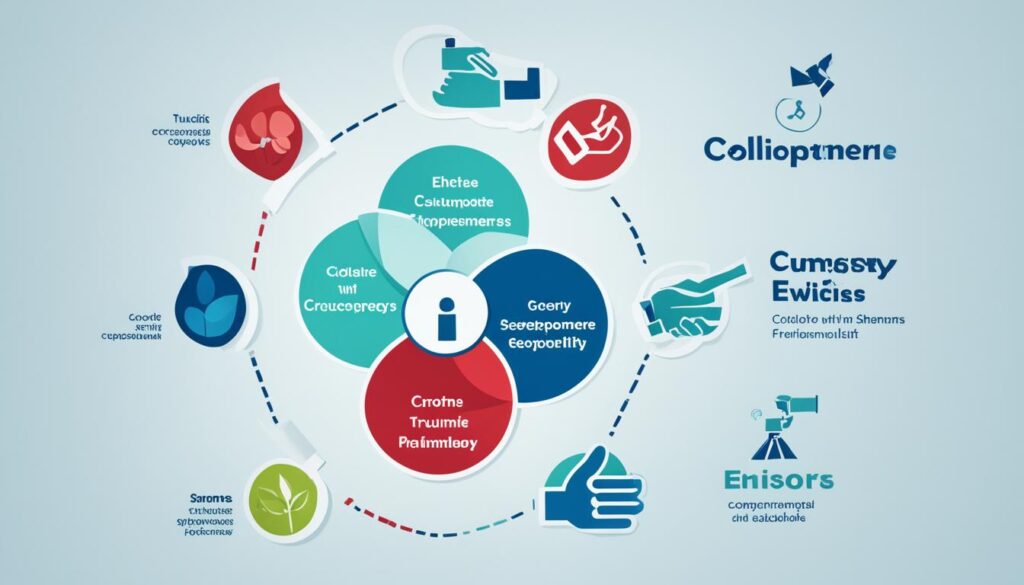In the fast-paced and ever-evolving realm of business leadership, the ability to make ethical decisions is paramount. Ethical decision making serves as the bedrock upon which successful leaders build their organizations, fostering trust, integrity, and long-term sustainability. This section unravels the fundamental importance of ethical decision making, shedding light on how it shapes the strategic management landscape.
Key Takeaways:
- Ethical decision making is crucial in business leadership
- It fosters trust, integrity, and long-term sustainability
- Consistent ethical choices establish trust and build a strong reputation
- Ethical decision making guides organizational culture and behavior
- Ethical decision making equips leaders to navigate through complex challenges
Establishing Trust and Building Reputation
One of the primary reasons ethical decision making holds such significance in business leadership is its ability to establish trust and build a strong reputation. When leaders consistently make ethical choices, they demonstrate their commitment to integrity and gain the trust of employees, customers, and stakeholders. This trust forms the basis for productive relationships and enduring partnerships, fueling business growth in the long run.
According to a study by Harvard Business Review, companies perceived to have high ethical standards are more likely to enjoy greater customer trust and loyalty, leading to increased sales and market share.
“Reputation is an economic asset, and ethics is the foundation of trust. Without trust, a company’s image is tarnished, making it difficult to attract and retain customers. By prioritizing ethical decision making, businesses can build a solid reputation and establish themselves as trustworthy partners in the marketplace.”
– Jane Williams, CEO of Integrity Inc.
Building trust and maintaining a positive reputation are essential for long-term business growth. Trust is the currency of successful relationships, enabling open communication, collaboration, and loyalty. When stakeholders trust a company, they are more likely to engage in mutually beneficial interactions, such as repeat purchases, referrals, and strategic partnerships. This not only drives revenue but also enhances the overall sustainability and success of the business.
By prioritizing ethical decision making, leaders create a culture of trust within their organizations. Employees feel empowered to act with integrity and are more likely to align their actions with the company’s values. This fosters a positive work environment, improves employee morale, and ultimately attracts and retains top talent. Moreover, a reputation for ethical behavior enhances a company’s ability to attract investment, secure valuable partnerships, and build a strong presence in the market.

As business growth relies on the trust and support of stakeholders, it is crucial for leaders to prioritize ethical decision making. By doing so, they not only build a solid reputation but also gain a competitive edge in the marketplace. Research shows that consumers are increasingly seeking out companies with ethical values and are willing to pay more for their products and services. This presents an opportunity for businesses to not only drive financial success but also make a positive impact on society.
Next, we will explore how ethical decision making plays a significant role in guiding organizational culture, ensuring that businesses operate within ethical boundaries and promote integrity at all levels.
Guiding Organizational Culture
Effective leaders understand that their actions speak louder than words. By consistently making ethical decisions, leaders set a positive example for their employees and foster a culture of integrity within the organization. Ethical decision making becomes the compass that guides employees’ behavior, ensuring that the organization operates within ethical boundaries and aligns its actions with its values.
When leaders prioritize ethical decision making, they instill a sense of trust and confidence in their team members. Employees feel valued and supported, knowing that their leaders prioritize integrity and ethical behavior. As a result, organizational culture becomes one that upholds the principles of honesty, fairness, and respect.
An organization with a strong ethical culture benefits from increased employee engagement and loyalty. It creates an environment where team members feel comfortable speaking up about ethical concerns and can trust that their voices will be heard. This fosters open communication, collaboration, and innovation, driving the organization towards long-term success.
“Leadership is not about being in charge. It is about taking care of those in your charge.” – Simon Sinek
Organizational culture plays a crucial role in shaping employee behavior and decision making. When ethical decision making is the norm, employees are more likely to make ethical choices in their day-to-day work. This ensures consistency and reinforces the organization’s commitment to ethical conduct.
Building Trust and Resilience
An ethical organizational culture builds trust, not only among employees but also with external stakeholders such as customers, suppliers, and investors. Trust is the foundation of strong relationships, and when stakeholders trust an organization, they are more likely to engage in mutually beneficial partnerships and support the company’s growth.
Furthermore, an ethical culture enhances the organization’s reputation, which is vital for long-term success. A positive reputation attracts top talent, loyal customers, and investors who value ethical behavior. It also acts as a safeguard against potential reputational damage that could arise from unethical practices.
To illustrate the impact of a strong ethical culture, consider the case of Patagonia, the outdoor clothing company. Patagonia has a strong commitment to environmental sustainability and ethical manufacturing practices. By aligning its actions with its values, the company not only attracts customers who care about these issues but also establishes itself as a trusted brand in the industry.

Implications for Ethical Decision Making
Organizational culture and ethical decision making are deeply intertwined. Leaders must prioritize ethical behavior and create an environment where ethical decision making is encouraged and rewarded. This involves fostering open communication channels, providing clear ethical guidelines, and offering support and resources for ethical dilemmas.
By guiding organizational culture towards ethical decision making, leaders can ensure that all employees understand the importance of integrity, honesty, and accountability. This, in turn, strengthens the organization’s ability to navigate complex challenges and make decisions that align with its values.
Ultimately, an organization with a strong ethical culture stands the test of time. It attracts and retains top talent, maintains the trust of stakeholders, and positions itself for sustainable growth and success in an increasingly competitive business landscape.
Navigating Through Complex Challenges
Business leaders often find themselves confronted with a myriad of complex challenges that require careful analysis and decision-making. These challenges may arise from rapidly evolving markets, technological disruptions, changing consumer demands, or unforeseen external factors. To successfully navigate through these intricate scenarios, leaders must rely on a robust framework of ethical decision-making.
Ethical decision-making serves as a guiding compass, enabling leaders to make informed choices that not only address immediate challenges but also contribute to the long-term success and sustainability of their organizations. By considering the ethical implications of their decisions, leaders can ensure that their actions align with their values, maintain stakeholder trust, and foster a positive organizational culture.
Embracing Complexity: A Holistic Approach
Complex challenges necessitate a holistic approach that goes beyond short-term fixes or quick gains. Ethical decision-making requires leaders to assess the multifaceted dimensions of a challenge, considering the diverse perspectives and interests of various stakeholders. By embracing complexity, leaders can develop comprehensive solutions that not only resolve immediate issues but also establish a foundation for sustainable growth.
Furthermore, ethical decision-making embraces the principles of fairness, transparency, and accountability. Rather than succumbing to expedient yet unsustainable solutions, leaders prioritize creating value for all stakeholders, fostering collaborative relationships, and promoting long-term ethical practices.
Leaders who navigate through complex challenges with an ethical lens not only ensure the survival of their organizations but also set the stage for their long-term success and sustainability.
The Role of Effective Communication
Effective communication plays a pivotal role in the process of ethical decision-making amidst complex challenges. By engaging in open and transparent communication, leaders can actively involve stakeholders, seek diverse perspectives, and gain valuable insights that contribute to sound decision-making. Transparent communication also helps build trust and enhance accountability, as stakeholders are more likely to support decisions that are communicated honestly and clearly.
Moreover, effective communication fosters an environment where ethical considerations are actively discussed and incorporated into the decision-making process. By encouraging open dialogue, leaders can ensure that ethical values and principles remain at the forefront, guiding the organization’s actions even in the face of complex challenges.
| Ethical Decision-Making for Complex Challenges | Benefits |
|---|---|
| Promotes long-term success | – Provides a strategic direction that aligns with the organization’s values – Enhances stakeholder trust and loyalty |
| Fosters sustainability | – Supports environmentally responsible practices – Mitigates reputation risks and legal liabilities |
| Nurtures an ethical organizational culture | – Establishes a foundation for ethical behavior across the organization – Encourages employee engagement and commitment |
As leaders navigate through complex challenges, ethical decision-making serves as a compass that guides them towards sustainable outcomes. By embracing complexity, fostering effective communication, and incorporating ethical values, leaders can ensure the long-term success and sustainability of their organizations.
The Ethical Dilemma: Balancing Stakeholder Interests
Effective leaders in business understand that organizations do not exist in isolation. Instead, they are interconnected with a diverse range of stakeholders, each with their own set of interests. Ethical decision making requires leaders to consider and balance these stakeholder interests in order to ensure fairness and sustainability.
Stakeholders of a business can include employees, customers, investors, communities, and even the environment. Each group has unique needs and expectations, which must be taken into account when making decisions. By prioritizing stakeholder interests, leaders uphold the principles of fairness and promote sustainable practices that benefit all parties involved.
For example, when making strategic decisions, ethical leaders consider the potential impacts on employees’ job security, work-life balance, and career development. They also take into account customers’ needs, satisfaction, and safety, which contribute to long-term loyalty and business growth. Furthermore, ethical leaders recognize the importance of responsible financial management to safeguard investors’ interests and sustain the organization’s profitability.
Furthermore, ethical decision making extends beyond immediate stakeholders to encompass the broader community and the environment. Leaders who prioritize sustainability take into account the social and environmental implications of their actions, recognizing the need for responsible resource management, waste reduction, and carbon footprint reduction.
By actively considering and balancing these diverse stakeholder interests, leaders can foster long-term relationships, build trust, and promote a culture of fairness within their organizations. Ethical decision making intertwines with the core values of a business, laying the foundation for sustainable growth and positive social impact.
“Ethical decision making requires leaders to carefully consider and balance the interests of all stakeholders involved. By doing so, leaders promote fairness and sustainability, leading to long-term success.”
| Stakeholder | Interests |
|---|---|
| Employees | Career growth, work-life balance, job security |
| Customers | Product quality, safety, satisfaction |
| Investors | Return on investment, financial stability |
| Communities | Positive social impact, local development |
| Environment | Sustainability, responsible resource management |
By balancing these stakeholder interests, leaders ensure that their decisions align with the principles of fairness, sustainability, and ethical conduct. This ethical dilemma is an ongoing challenge that demands consideration and thoughtful decision making to navigate the complexities of the modern business landscape.
Ethical Decision Making: A Catalyst for Sustainable Business Growth
The integration of ethical decision making into strategic management practices has far-reaching implications for sustainable business growth. When organizations prioritize ethical decision making, they ensure that their operations are conducted within legal and ethical boundaries. By doing so, they safeguard their reputation and protect themselves from potential consequences such as reputational damage, legal repercussions, and financial losses.
Moreover, ethical decision making fosters organizational resilience, enabling businesses to weather challenges and emerge stronger. By upholding ethical values and avoiding unethical practices, leaders establish a foundation of trust and integrity within their organizations. This cultivates a positive organizational culture that motivates employees, attracts customers, and forges enduring partnerships.
Additionally, ethical decision making provides businesses with a significant competitive advantage. In an increasingly conscious marketplace, customers are more likely to support and engage with ethical businesses. Conversely, companies that engage in unethical practices risk being boycotted and losing customer loyalty. By making ethical decisions, organizations can differentiate themselves from their competitors, attract a loyal customer base, and solidify their market position.
Clearly, ethical decision making is not only the right thing to do but also a strategic imperative for sustainable business growth. By integrating ethics into their decision-making processes, organizations can build trust, foster resilience, and gain a competitive edge. In today’s rapidly evolving business landscape, ethical decision making remains a powerful catalyst for long-term success and prosperity.






